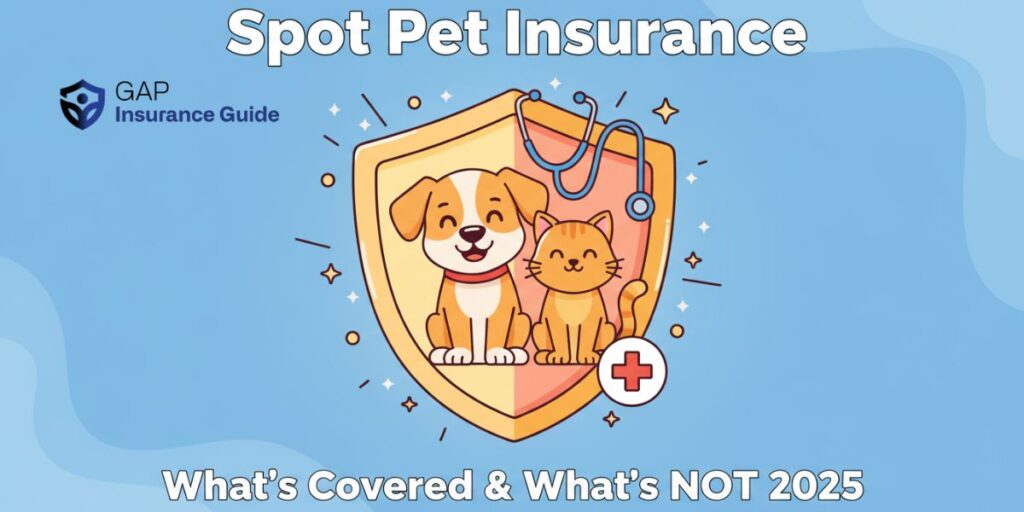If you’ve ever faced a surprise vet bill, you know how stressful it feels to balance your pet’s health with your budget. That’s where pet insurance steps in, and Spot Pet Insurance has become one of the most talked-about options in 2025.
But here’s the catch: not everything is covered. Too many pet parents only discover the fine print after filing a claim. This post is your clear, no-nonsense guide to Spot Pet Insurance what’s included, what’s excluded, and how to decide if it’s right for your furry family member.
By the end, you’ll know exactly what Spot pays for, where it draws the line, and how to avoid common mistakes when choosing your plan.
What Does Spot Pet Insurance Actually Cover?
Spot’s coverage is fairly broad compared to competitors, but it’s not unlimited. Here’s what most policies include:
Accidents & Emergencies
- Broken bones, cuts, swallowed objects
- Emergency surgery and hospitalization
- Diagnostic tests (X-rays, ultrasounds, bloodwork)
Illnesses
- Cancer treatment
- Digestive issues (like vomiting, diarrhea)
- Infections and chronic conditions
- Prescription medications
Hereditary & Congenital Conditions
Many breeds are prone to specific health issues (hip dysplasia, heart murmurs). Spot covers these as long as they aren’t pre-existing before enrollment.
Alternative Therapies
Acupuncture, chiropractic care, and hydrotherapy may be covered if your vet recommends them for recovery.
Optional Wellness Add-Ons
For routine care, you can tack on a wellness plan that helps pay for:
- Annual exams
- Vaccinations
- Dental cleanings
- Flea, tick, and heartworm prevention
What’s Not Covered by Spot Pet Insurance?
This is where most pet parents get caught off guard. Spot, like all pet insurers, has exclusions:
Pre-Existing Conditions
Any illness or injury that showed symptoms before enrollment or during the waiting period isn’t covered. Even if your pet was never formally diagnosed, Spot can deny claims if there’s a record of related symptoms.
Routine & Preventive Care (Without Add-On)
Standard policies won’t cover vaccines, spay/neuter, or microchipping unless you buy the wellness rider.
Cosmetic & Non-Essential Procedures
Ear cropping, tail docking, and declawing aren’t covered.
Breeding & Pregnancy Costs
Spot does not cover costs related to breeding, pregnancy, or birth.
Experimental Treatments
If your vet recommends a cutting-edge treatment without FDA or veterinary approval, don’t expect coverage.
How Spot Pet Insurance Compares in 2025
Pet insurance has exploded in popularity, and companies compete hard on what they cover. Spot stands out for flexibility:
- Customizable plans: You pick your deductible, annual limit, and reimbursement rate.
- Wide range of therapies: Spot covers many holistic and alternative treatments that others exclude.
- Strong illness coverage: Especially for chronic conditions and cancer care.
The trade-off? Premiums can run higher than budget insurers, and you need to read policy details carefully to avoid surprises.
Who Benefits Most from Spot Pet Insurance?
Spot isn’t a one-size-fits-all solution. It works best for:
- New pet parents: Puppies and kittens without pre-existing conditions get the most value.
- Breed owners with known risks: Bulldogs, German Shepherds, and other breeds prone to hereditary issues.
- Pet parents who want options: Especially if you believe in alternative therapies or want add-on wellness coverage.
If your pet is older with existing health issues, Spot may be less cost-effective since exclusions limit payouts.
Common Mistakes Pet Parents Make with Spot Insurance
- Assuming everything is covered. Always check exclusions.
- Skipping wellness add-ons. Routine care adds up fast.
- Waiting too long to enroll. Delaying means more conditions will count as pre-existing.
- Choosing the cheapest deductible. A low premium often means high out-of-pocket costs when emergencies strike.
How to Get the Most Value Out of Spot Pet Insurance
- Enroll early. The younger and healthier your pet, the better.
- Keep vet records organized. Makes claim approval smoother.
- Use direct deposit reimbursement. Spot often pays within a week.
- Review your policy annually. Adjust coverage as your pet ages.
FAQs About Spot Pet Insurance
Is Spot Pet Insurance worth it in 2025?
If you want broad illness and accident protection with the option to add preventive care, Spot is a strong choice—especially for young or high-risk breeds.
Does Spot Pet Insurance cover dental care?
Dental accidents and illnesses (like extractions for infection) are covered. Preventive cleanings require a wellness add-on.
How fast does Spot reimburse claims?
Most claims are paid within 2–5 business days via direct deposit, though complex cases can take longer.
Does Spot Pet Insurance cover prescriptions?
Yes, medications prescribed for covered illnesses or injuries are included.
Final Thoughts
Spot Pet Insurance isn’t perfect, but it’s one of the most flexible options in 2025. If you want accident and illness protection with the ability to customize add-ons for wellness or holistic care, Spot is worth a serious look.
The key is going in with clear eyes: know what’s covered, what’s not, and how the fine print affects your pet’s unique needs. That’s how you turn pet insurance from a confusing expense into real peace of mind.
Disclaimer: The content published on Gap Insurance Guide is intended for general information and educational purposes only. We cover topics related to insurance, banking, finance, and trading, but none of the material should be considered financial, legal, or investment advice. While we aim to provide accurate and up-to-date information, we make no guarantees about completeness, reliability, or accuracy. Any actions you take based on our content are strictly at your own risk, and Gap Insurance Guide will not be liable for any losses or damages. We strongly recommend consulting a licensed financial advisor, insurance expert, or other qualified professional before making decisions. Articles may include links to third-party websites, and we are not responsible for their content or practices.
I’m Abhilash, a finance and business content writer passionate about simplifying money matters. I share practical insights on finance, business growth, and insurance to help readers make informed decisions. Through my blogs and articles, I aim to provide clear, reliable, and actionable advice for smarter financial planning and success.



